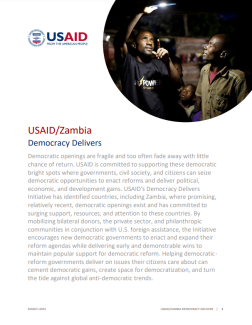Democracy Delivers
Democratic openings are fragile and too often fade away with little chance of return. USAID is committed to supporting these democratic bright spots where governments, civil society, and citizens can seize democratic opportunities to enact reforms and deliver political, economic, and development gains. USAID's Democracy Delivers Initiative has identified countries, including Zambia, where promising, relatively recent, democratic openings exist and has committed to surging support, resources, and attention to these countries. By mobilizing bilateral donors, the private sector, and philanthropic communities in conjunction with U.S. foreign assistance, the Initiative encourages new democratic governments to enact and expand their reform agendas while delivering early and demonstrable wins to maintain popular support for democratic reform. Helping democratic-reform governments deliver on issues their citizens care about can cement democratic gains, create space for democratization, and turn the tide against global anti-democratic trends.
In Zambia, USAID’s targeted “Wins” are based on the Zambian government’s priorities, which are ongoing activities or efforts that USAID is currently supporting. These priorities are food security, local governance and decentralization, private sector involvement in malaria prevention, and access to quality education.
USAID’s Democracy Delivers Initiative in Zambia
Food Security: USAID is strengthening existing relationships with the Africa Fertilizer Agribusiness Partnership and Bill and Melinda Gates Foundation to ensure a timely and comprehensive achievement of delivering more fertilizer to Zambian farmers. As a part of the arrangement, USAID is supporting the training of about 20 agro-dealers in Zambia followed by a $1M credit guaranty to increase fertilizer production and availability in Zambia. Through the Democracy Delivers initiative, the mission is exploring the replication and expansion of this approach, to potentially expand to a $200M guaranty. USAID and the Bureau for Resilience and Food Security are working together to leverage centrally managed relationships with all partners to bring more attention to this opportunity.
Local Governance: Another Democracy Delivers ‘win’ centers around supporting the decentralization process and strengthening of local government. This work aims to empower citizens to select local development projects and decision-making occurring at lower levels of government and in line with Zambia’s decentralization implementation plan.There is an opportunity to advance anti-corruption and transparency through sustained and expanded support to local governments. Through Partnerships for Democratic Development (PDD) funding, USAID is conducting consultations with government representatives and local stakeholders around problem identification for this new activity.
Malaria: In health, there is an opportunity to amplify Zambia’s integrated and locally-led approach to ending malaria through promoting the End Malaria Council (EMC), which catalyzes the private sector, traditional leaders, faith leaders, and youth in the fight against malaria. The EMC has committed to prioritizing the 2023 mass campaign to distribute insecticide-treated bed nets (ITNs), aligning closely with the goals of the Ministry of Health and the U.S. President’s Malaria Initiative. USAID is rallying the private sector and faith-based organizations to join Zambia’s campaign to end malaria. Malaria control advocacy billboards in Zambia’s major cities feature an image of the President, Hakainde Hichilema, and the slogan “Join Me to End Malaria.” These billboards have amplified the end malaria campaign and symbolized the buy-in of the new government, given that the EMC was launched under the previous government.
Education: In 2022, Zambian President Hichilema fulfilled his campaign promise of free education by abolishing school fees for public schools. Zambia’s enforcement of the elimination of school fees and deployment of 30,000 new teachers expanded access to primary education. In this context, there is an opportunity to engage with the Zambian government and partners to ensure teacher allocation and deployment are focused on schools with the highest student enrollment. USAID is supporting the government to reform teacher education and providing in-service teacher training that will be critical to support this new education workforce.

